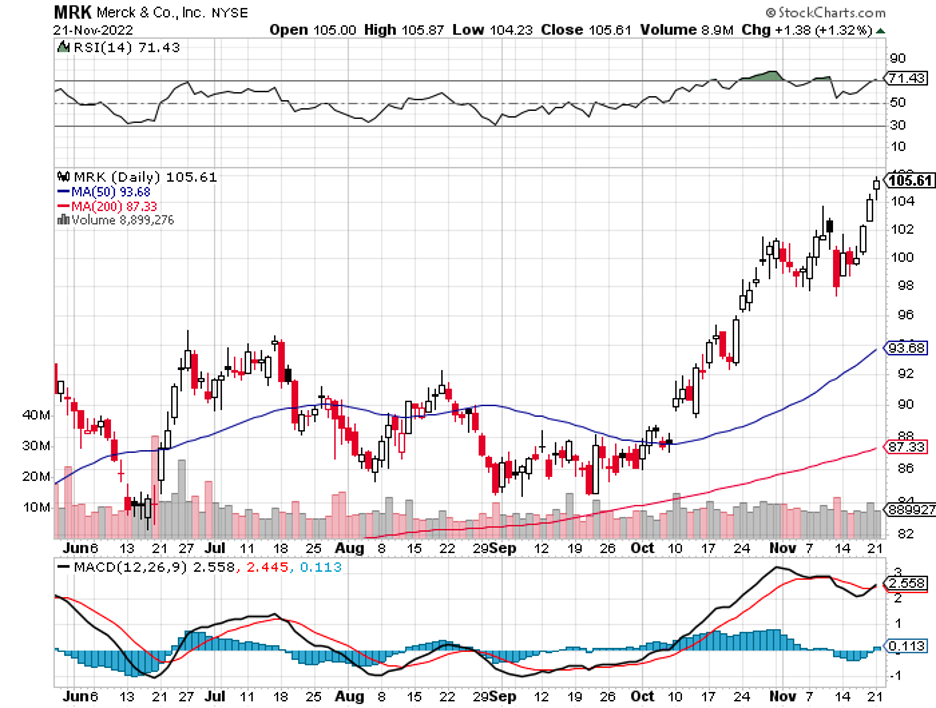The Stock That Keeps on Giving
Although the broader market has been experiencing the worst year in a very long time, some businesses still manage to deliver excellent results.
One of them is Merck (MRK).
This biotechnology and healthcare giant has been defying gravity this 2022. While the Health Care Select Sector SPDR (XLV) has slid by quite a substantial margin this year, with the likes of Johnson & Johnson (JNJ) and Pfizer (PFE) succumbing to the pressure, Merck bucked the trend. Its shares have been up by 31% since early January.
Amid the economic and financial crises, Merck remains a promising stock with a number of factors going its way. More importantly, there is a high probability that it can sustain its momentum regardless of what happens to the broader market or the economy.
Merck’s determination to keep this momentum has once again become apparent in its recent announcement.
Earlier this week, the biotech giant disclosed that it would acquire a biopharmaceutical company called Imago BioSciences (IMG) for $1.35 billion.
This would translate to $36 in cash for every share of Imago, which is about twice its recent closing price of $17.40. The deal is anticipated to be completed by March 2023.
Like its large competitors, Merck also has a portfolio of treatments that continue to aid in the growth of its top and bottom lines.
In the third quarter of this year, the biotech’s revenue climbed by 14% year-over-year to reach roughly $15 billion. Meanwhile, its adjusted net income was $4.7 billion, showing a 4% increase compared to the same period in 2021.
Among its products, Merck has been most closely associated with the cancer drug Keytruda. So far, this treatment is on track to rake in $20 billion in net sales this year alone.
In fact, it’s expected to surpass AbbVie’s (ABBV) Humira as the top-selling drug by 2026.
With Keytruda’s patent exclusivity lasting until 2028, Merck has more than sufficient time to prepare for it. Moreover, that means the company can still rely on Keytruda as a strong growth driver for at least five more years.
However, astute investors would point out Merck’s reliance on Keytruda and the risks that come with this arrangement. With the mega-blockbuster’s $5.4 billion net sales, which comprised 36.3% of Merck’s $15 billion total sales in the third quarter, this is a legitimate concern.
It should be noted that Keytruda isn’t the only promising moneymaking treatment in Merck’s portfolio.
One of its promising treatments is its collaboration with AstraZeneca (AZN), which resulted in another cancer medicine called Lynparza. Another is Merck’s HPV vaccines, which continue to rise at a good pace. Finally, the company’s vaccine portfolio has been expanding, with its pneumococcal vaccine recently gaining approval.
Most of its therapies and even its vaccine franchises are on pace to surpass at least $1 billion in net sales this 2022. Needless to say, Merck has been successful in its quest to become more than just a cancer therapy leader.
On top of these, another good reason to take Merck into consideration is its dividend yield.
Merck’s current dividend yield is at 2.8%, which outpaces the 1.6% average yield of the S&P 500. Aside from its top-selling products and robust pipeline that easily support this payout, the company’s dividend is well-covered as well.
Overall, Merck is one of the handful of companies across all industries that has been breaking the norm of poor stock performance in this highly challenging year.
The company can offer a strong shield for wary investors as we deal with the onset of yet another recession. Not only is this biotechnology and healthcare company part of a naturally defensive sector, but its outlook also remains positive amid the issues plaguing the world.

